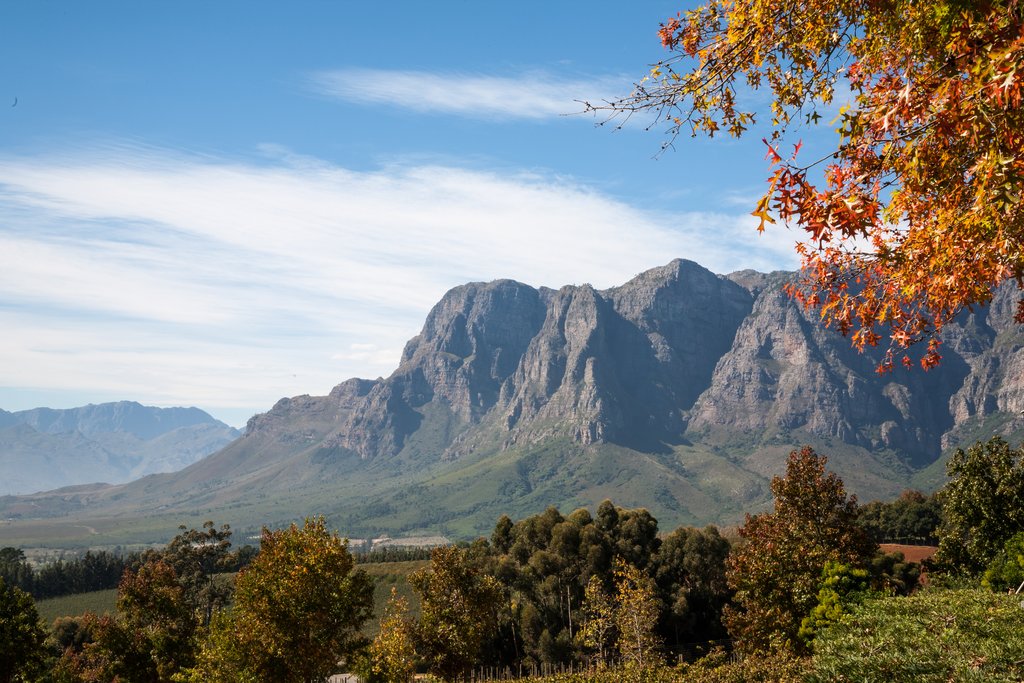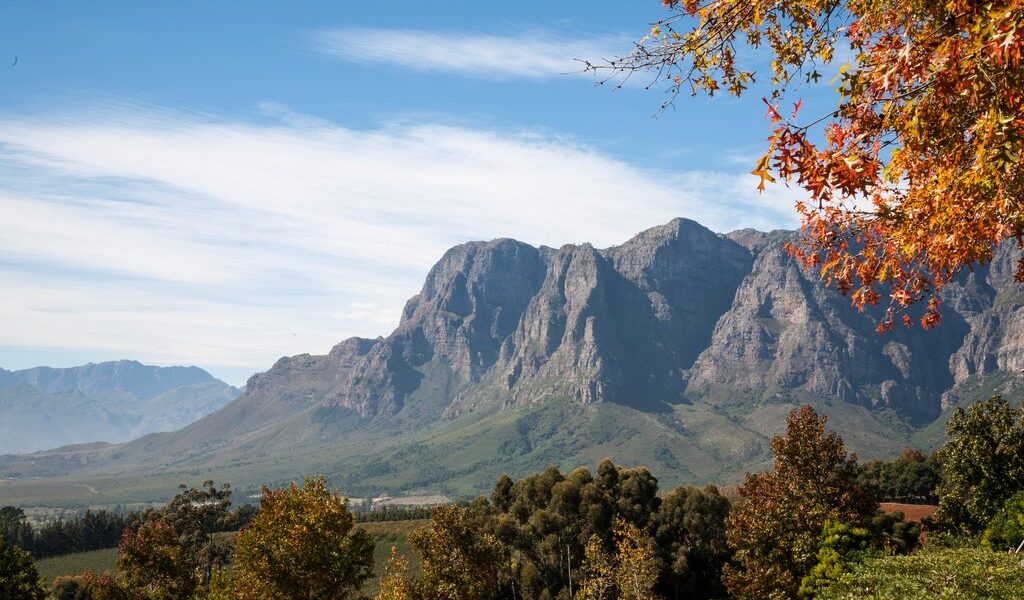
South Africa is a year-round destination thanks to its varied landscapes—it’s always sunny somewhere. No matter what season you visit, you’ll find something to do: Kruger safaris in winter, Hermanus whale watching in spring, Cape Town beaches in the summer, and Franschoek wine in the fall. Visit during spring or autumn when the weather is predictable and mild, wildlife is active, and there are fewer crowds. Read on for advice on South Africa’s weather, unmissable events, and travel tips.
## Unveiling South Africa: A Seasonal Guide to Planning Your Dream Trip
South Africa, a land of breathtaking landscapes and vibrant ecosystems, beckons travelers throughout the year. Its diverse geography ensures that every season offers a unique and rewarding experience. While fall and spring often steal the spotlight as the most desirable times to visit, each season presents its own distinct charm and opportunities for adventure. For travelers arriving from the Northern Hemisphere, it’s essential to remember that South Africa’s seasons are inverted due to its location south of the Equator. Winter unfolds from June to August, while the warmth of summer embraces the land from December to February. No matter the time of year, South Africa welcomes you with open arms. However, to truly optimize your journey, consider aligning your travel plans with the regional weather patterns. Be mindful of the summer thunderstorms that grace the northern regions and the potential for cloudy winter days in the south, allowing you to curate an unforgettable experience tailored to your preferences.
The shoulder seasons, spring (September to November) and autumn (March to May), emerge as the sweet spot for many travelers. The weather during these periods is remarkably predictable, characterized by refreshing nights and pleasantly warm days that extend across the entire country. This harmonious climate, combined with fewer crowds and more appealing prices, makes spring and autumn ideal for exploring South Africa’s natural wonders and cultural treasures. Wildlife enthusiasts will find these seasons particularly rewarding, as animals are often more active and easier to spot. During these transition periods, the **Cape Peninsula** flourishes with sunshine and mild temperatures, punctuated by occasional refreshing showers. Opting for a visit during the shoulder season allows you to effortlessly sidestep the rainy conditions that can sometimes affect the northern regions near **Johannesburg** and **Kruger**. Moreover, you’ll avoid the bustling crowds that typically gather in the national parks during peak seasons.
Spring unveils a spectacle of vibrant wildflowers blooming across the normally arid landscapes, while also heralding the arrival of migrating whales along the coast. Autumn, on the other hand, offers the chance to savor the rich flavors of South African wine amidst the stunning backdrop of changing leaves.
**Cape Town**, a jewel of South Africa, is a perennial favorite among visitors. The majority of tourists flock to the city between September and April, coinciding with the Southern Hemisphere’s summer. However, the winter months, spanning from April to September, can bring increased rainfall and strong winds to **Cape Town**. The nearby **Winelands** also enter their dormant phase during this period, with the grapevines resting without their fruit. For those seeking romantic evenings among the picturesque vineyards and rolling hills, it’s advisable to visit the Winelands during spring, summer, or fall, when the grapes are actively ripening. It’s worth considering that the inland regions can experience significant heat during the summer months, while spring and fall offer a more balanced climate with cool mornings and comfortably warm afternoons.
If your travel plans include **Johannesburg** or the expansive savannahs of the north, a winter safari to **Kruger National Park** presents an exceptional opportunity. These areas experience minimal rainfall during the winter months, providing for relatively warm days and cooler nights. As an added bonus, the deciduous trees shed their leaves, enhancing visibility and making it easier to spot the diverse wildlife. While spring and autumn are generally considered the optimal seasons for visiting the north due to their predictable weather patterns, a summer trip offers the unique opportunity to witness adorable baby animals. However, be prepared for higher temperatures and increased rainfall during the summer months, often in the form of afternoon or evening thunderstorms. Remember to factor these weather conditions into your travel plans and outdoor activities.
## Spring in South Africa (September to November): A Season of Rebirth and Renewal
Spring stands out as one of South Africa’s coveted shoulder seasons, widely regarded as an ideal time to explore the country. The weather is generally pleasant, offering a wide array of activities to entertain the entire family. You’ll also benefit from lower prices and greater availability at hotels and restaurants. Embrace the opportunity to experience the cool mornings and nights, along with the warm, sunny days that characterize this season. If you have an affinity for flowers, a September visit to the **Northern Cape** is an absolute must. During this time, the normally dry landscape undergoes a remarkable transformation, as countless wildflowers burst into bloom, creating a kaleidoscope of colors. **Namaqua National Park** is a premier destination for witnessing this natural spectacle, where a rainbow of flowers carpets the ground, creating an awe-inspiring sight.
Springtime also marks the peak season for whale watching. Several whale species, including humpback, southern right whales, and Bryde’s whales, converge near **Hermanus**, off the southern coast.
In **Cape Town**, the weather is perfectly suited for hiking to the summit of **Table Mountain**. It also makes it an ideal time to leisurely enjoy the city’s finest restaurants without the usual struggle to secure a table. While the weather can be slightly unpredictable, it’s wise to pack both warm layers and a light waterproof jacket. However, you’re unlikely to encounter prolonged periods of rain during your visit. The pleasant weather also sets the stage for a memorable road trip along **Route 62** and the renowned **Garden Route**, brimming with attractions like wildlife sanctuaries, the thrilling Bloukran’s Bridge (a hotspot for bungee jumping), and charming, quirky towns that will capture your imagination.
A short distance up the coast in **iSimangaliso Wetland Park** and the adjacent regions of **KwaZulu-Natal**, sea turtles emerge from the ocean to lay their eggs on the pristine, sandy beaches. In November, the areas around **Richards Bay** and **St. Lucia** become prime locations for witnessing this incredible natural event. Spring is also considered one of the best times to embark on a safari adventure in one of South Africa’s numerous national parks or game reserves. The animals exhibit heightened activity levels, and the foliage is less dense compared to the summer months, making wildlife spotting easier. Additionally, you’ll avoid the potentially chilly mornings that can accompany winter safaris. Many wildlife species give birth during this time, offering the chance to observe adorable baby animals nestled in the bush.
### Events in Spring
* **Hermanus Whale Festival**, **Hermanus**: In late September, locals and tourists gather in **Hermanus** to enjoy three days filled with music, street parades, artistic displays, culinary delights, “eco-marine” exhibitions, and, of course, ample whale-watching opportunities. It is recommended to book accommodations well in advance.
* **Royal Reed Dance Festival**, **Nongoma**: This vibrant four-day celebration in Nongoma, **KwaZulu-Natal**, represents a significant rite of passage for thousands of young Zulu women, who proudly parade in traditional attire.
* **Oktoberfest**, **Port Elizabeth**: Pack your traditional German attire and make your way to **Port Elizabeth** for Africa’s largest Oktoberfest celebration, complete with copious amounts of beer, oom-pah-pah music, and a delightful selection of schnitzel and wurst.
## Summer in South Africa (December to February): Bask in the Sun and Embrace the Warmth
Summer in South Africa is a time of vibrant energy and abundant sunshine, making it a popular choice for travelers. However, it’s also the busiest season, with warm weather and clear skies attracting both international visitors and South African families on summer vacation. It’s important to plan your trip well in advance to secure accommodations and avoid disappointment. In the **Cape Provinces**, summer is generally characterized by hot and dry conditions, with cloudless skies and average temperatures hovering around 75°F (24°C). The nearby **Winelands** offer a delightful escape, with opportunities for leisurely afternoon picnics under the shade of oak trees and relaxing days spent exploring the picturesque vineyards. The summer months are also ideal for exploring the **Cape Peninsula**. However, keep in mind that the ocean water can still be quite cold. If you’re a devoted beach enthusiast, consider heading north along the coast, where the water temperatures often reach a more inviting 81°F (27°C).
Summer presents a perfect opportunity for a scenic road trip with the windows down along the celebrated **Garden Route**, renowned as one of South Africa’s longest wine-tasting routes. Alternatively, explore the quirky charm of **Route 62**, with its many unique stops, including the famous **Ronnie’s Sex Shop**, which, despite its name, is actually an eclectic and entertaining restaurant. In the northern regions, summer coincides with the rainy season, bringing frequent afternoon thunderstorms and average temperatures of 77°F (25°C) in **Johannesburg**. If you don’t mind occasional wet weather, this can be a great time to explore Johannesburg and its surrounding national parks, as many locals head to the coast, leaving the area less crowded.
Game viewing in national parks and reserves remains a popular activity during the summer months. However, the lush foliage can make it slightly more challenging to spot wildlife. Nevertheless, these months offer plenty of opportunities to capture photographs of adorable baby animals, if you can find them amidst the dense foliage. Keep in mind that summer weather in **Kruger** can be oppressively hot and humid, making extended periods in an open-top game vehicle uncomfortable, especially for young children. Consider spending time in one of the country’s smaller, more intimate game reserves, such as **Phinda Private Game Reserve**, **Thanda Safari Private Game Reserve**, or **Gorah Elephant Camp**. Camping is generally not recommended during the summer months, so it’s essential to book lodging well in advance to secure your preferred accommodations.
The **KwaZulu-Natal coast** also experiences sweltering humidity and dramatic thunderstorms during the summer months. For those who can tolerate the heat, birding in the north offers a unique and rewarding experience, as countless migrating species flock to the wetlands and protected coastal areas. Summer is South Africa’s peak growing and farming season, with fresh produce, wine, and seafood readily available. Consider exploring the country’s culinary scene on a curated food and wine itinerary.
### Events in Summer
* **Franschhoek Cap Classique and Champagne Festival**: Held in early December on the lawns surrounding the iconic Huguenot Monument in **Franschhoek**, this themed annual event is a highlight of the social calendar. Sample the finest sparkling wines from wineries in the region, complemented by culinary delights from **Franschhoek’s** world-class restaurants.
* **Durban Jazz Festival**: This outdoor event takes place each December 26 and features a lineup of top African jazz performers.
* **Re-enactment of the Battles of Isandlwana and Rorke’s Drift**: Every January 21, local Zulu warriors and the Dundee Diehards re-enactment team, dressed in period military costumes, engage in a bloodless reenactment of these historical battles from the Anglo-Zulu War in 1879.
## Fall in South Africa (March to May): A Symphony of Colors and Pleasant Weather
As one of the coveted shoulder seasons, autumn presents an appealing option for travelers seeking to escape the summer heat and avoid the crowds. April and May typically define the season, characterized by changing leaves, drier days, and a reduced chance of unexpected rainfall in the north. **Kruger** emerges from the summer rains, and with fewer visitors in March and April, it’s an opportune time to secure a deal to witness the wildebeest, warthogs, and impala during their rutting season. While you might not see wildlife congregating at water holes as frequently as in the winter months, you can still catch the tail end of migrating bird flocks before they depart for the season.
Visiting **Kruger** in May offers enhanced wildlife viewing opportunities, but it also means contending with larger crowds. To escape the throng, consider exploring less frequented locations, such as **Kgalagadi Transfrontier Park** or **Namaqua National Park**, for a more remote and immersive experience.
Meanwhile, the **Cape Provinces** gradually transition into cloudier weather, with the possibility of afternoon thunderstorms and cooler temperatures. In March and early April, the weather is still dry enough to permit hikes up to **Table Mountain**, but be sure to check the forecast before you venture out. Autumn in the **Winelands** exudes romance, offering pleasant weather and less competition for dinner reservations. **Franschhoek** and **Stellenbosch** are particularly captivating, as the grapevines display vibrant hues of red and orange against the mountain backdrop. It’s a wonderful time to visit and savor the end-of-season wines while basking in the sunshine and admiring the stunning mountain views.
For those seeking sun and sea, autumn is an excellent time to appreciate the KwaZulu-Natal coast without the throngs of tourists. The water remains warm enough for swimming throughout the year. Visit in April or May, and you’ll find yourself comfortable wearing just a t-shirt after a morning dip in the Indian Ocean. Near the end of the season, the annual sardine migration attracts vast numbers of sharks and dolphins, providing incredible scuba diving opportunities near **Durban**. Just inland from **Durban** in the Midlands district, the intense summer heat has subsided, making it an ideal time to explore the grand country houses and spa resorts that dot the region. And in the **Drakensberg** mountains, the moderate weather is perfect for hiking, biking, and horseback riding.
Consider a curated itinerary that allows you to hike on **Table Mountain** in **Cape Town**, sample wine and cheese in **Franschhoek**, ride in a hot air balloon in **Johannesburg**, embark on a wildlife safari in **Kruger**, and bask in the sun on the **KwaZulu-Natal coast**.
### Events in Fall
* **Klein Karoo National Arts Festival**, **Outsdoorn**: This celebration of Afrikaans culture features exhibitions, music, and theater and has a significant classical music component. Held in late March, it extends into April.
* **Cape Town Cycle Tour**: Thousands of cyclists from around the world converge for what is touted as the world’s largest cycling event. This celebration of cycling includes an Expo, a kid’s race, a mountain bike challenge, plus the 68-mile (110-km) Cycle Tour race.
* **Zoo Lake Family Braai Picnic & Color Festival**, **Johannesburg**: This festival is the biggest “bring and braai” picnic of all.
## Winter in South Africa (June to August): A Safari Paradise and Whale-Watching Spectacle
For safari enthusiasts, winter offers an exceptional opportunity to explore South Africa’s national parks. While game drives in the evenings and early mornings can be chilly, the rewards are well worth the effort. The lack of rainfall leads to sparse vegetation, making it easier to spot wildlife. The cooler temperatures also mean that animals are generally more active, allowing you to witness them in motion rather than simply observing them resting in the heat of the day. However, this peak season means that crowds are denser and prices are higher, so plan your visit for early June or late July to avoid the mid-July school holiday rush.
Winter is also the prime time for whale watching around the Cape or near **Hermanus**, as the whale migration season typically spans from June to November. The roads can be crowded with visitors, so be sure to book accommodations along the coast well in advance. In contrast, winter is the quieter season in the **Winelands**, making it easier to secure restaurant reservations in **Franschoek**.
Snow is relatively uncommon in South Africa, even during the winter months, although certain areas do receive snowfall each year. If you dream of a snowy getaway, consider a trip to **Tiffindell**, which offers skiing and snowboarding in June, July, and August. Lucky visitors might also awaken to a blanket of snow in the magnificent **Drakensberg Mountains** during winter. For those willing to take a road trip, **Sutherland** is renowned for its cold weather and remarkably clear skies. It’s also home to the Southern African Large Telescope (SALT), making it an appealing destination for those who enjoy stargazing, snow, and cozy nights with hot chocolate.
Travelers seeking a sunny beach escape should consider visiting **Durban** and the **KwaZulu-Natal coast**, where the water remains warm and the weather is generally sunny and dry.
If you plan to stay around **Cape Town** during the winter months, you’ll benefit from lower rates and greater availability. However, be prepared for colder and wetter conditions, with afternoons spent indoors at museums and occasional sunny days suitable for hiking **Table Mountain**. For these reasons, it’s often recommended to visit the Western Cape during autumn, spring, or summer, if possible.
### Events in Winter
* **National Arts Festival**, **Makhanda**: In Eastern Cape, hosts South Africa’s largest arts festival, showcasing a diverse range of genres from art to fringe theater. Performances take place in various venues throughout the town.
* **Vodacom Durban**: Part horse race, part fashion spectacle, this premier sports event draws crowds.
* **Knysna Oyster Festival**: Timed to coincide with the early July school holidays, this festival features sporting events, cooking classes and competitions, wine and whiskey tastings, live music, and an abundance of oysters.
## When is the Best Time to Visit South Africa? A Final Word
The shoulder seasons (fall and spring) are widely regarded as the best times to visit, as they offer a balance of pleasant weather, lower prices, smaller crowds, and excellent opportunities for a variety of nature-based activities, including safaris, whale watching, and surfing. Autumn (March to May) is a particularly enchanting time to explore the Winelands, with the vibrant colors of the grapevines providing a romantic backdrop for afternoon wine tastings. During the spring months (September to November), the town of **Hermanus** transforms into one of the world’s foremost whale-watching destinations.
Summer (December to February) is well-suited for road trips and sightseeing near **Cape Town** and along **Route 62**, while winter (June to August) is the ideal time for a safari adventure near **Kruger**, offering crisp mornings and active wildlife.
B-2293

